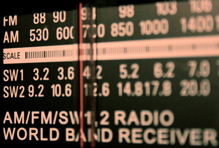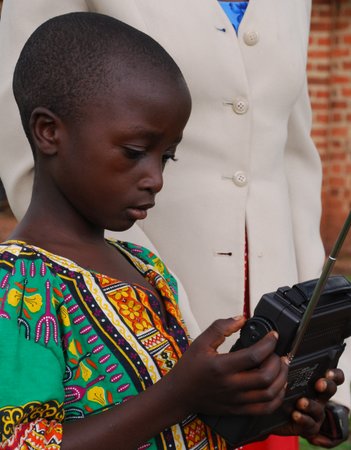Thanks to the Southgate ARC for bringing this to my attention:
The radio this reporter demonstrates is a shortwave version of the Eton FR160.
Tag Archives: Why Radio
Zimbabwe: are shortwave radios now illegal?
 According to SW Radio Africa, it appears that shortwave radios could now be considered “illegal communicating devices” in Zimbabwe:
According to SW Radio Africa, it appears that shortwave radios could now be considered “illegal communicating devices” in Zimbabwe:
Police have announced a ban on ‘specially designed radios’ that are ‘not compatible with state owned stations’, claiming the devices would be used to communicate hate speech ahead of polls scheduled for this year.
In a move seen as an attempt to silence external radio stations, such as SW Radio Africa and VOA’s Studio 7, broadcasting to Zimbabwe via shortwave and medium wave, police spokesperson Charity Charamba threatened to deal with organizations that helped to distribute portable radios, saying recipients would also be arrested.
She told journalists at a press conference in Harare on Tuesday: “We have information that some people or political parties are engaging in illegal activities, that is to say they are distributing illegal communicating devices to unsuspecting members of the public.
“We strongly believe that the intentions of such people are not holy but meant to create and sow seeds of disharmony within the country, especially now that the country is about to embark on the referendum and harmonised elections.”
The shocking news comes as police upped their onslaught on civil society organization looking for subversive material, gadgets and recordings.
[…]Co-Home Affairs Minister Teresa Makoni revealed [..]that […] receivers only, without ability to transmit, are perfectly legal and that there is no law at present which disallows anyone donating radios to the public.
However the minister said she held lengthy discussions with Police Commissioner General Augustine Chihuri, who said he is concerned that NGOs always intensify distribution just before elections.
Makon[i] said: “I was very clear that airwaves are still restricted to other parties, that is why my party is distributing radios to our poor rural members…in the meantime he will have his engineers verify that the radios are simple receivers.”
Observers say this response ignores the fact that there is likely to be massive intimidation as the average police officer will not know the difference between a receiver and two-way radio communicators.
Click here to read Violet Ganda’s full report on SW Radio Africa.
Thanks, Rich, for bringing this to my attention.
The relevance of shortwave radio for UNESCO’s World Radio Day 2013

Student in Uganda tunes an Ears To Our World self-powered shortwave radio. (Photo: ETOW partner, The Empower Campaign, Uganda)
Wednesday, February 13th 2013 is World Radio Day. UNESCO describes World Radio Day as “a day to celebrate radio as a medium; to improve international cooperation between broadcasters; and to encourage major networks and community radio alike to promote access to information and freedom of expression over the airwaves.”
A worthy cause.
UNESCO asked me to record a segment about our non-profit, Ears To Our World, and the relevance of radio in honor of World Radio Day.
RFE: Radio Farda Families A Target In Iran
 One of the points I often make is that repressive regimes can track and take action against citizens who read online content from banned/blocked media sources. Here is a case in point:
One of the points I often make is that repressive regimes can track and take action against citizens who read online content from banned/blocked media sources. Here is a case in point:
(Source: Radio Free Europe)
In an escalation of ongoing efforts to thwart Radio Farda, RFE/RL’s Persian-language Service, Iranian authorities are interrogating journalists’ family members in Iran.
Employees of Radio Farda believe that their journalism, which attracts over 10 million page views monthly on Radio Farda’s website, is the motive behind at least 20 incidents this year involving the interrogation and intimidation of their family members in Iran by officials of the country’s Intelligence Ministry.
In sessions that sometimes lasted for several hours, agents denounced the work of Radio Farda journalists and warned family members against having further contact with them. In several cases they instructed family members to tell their relatives to resign from their jobs and return to Iran; in one instance they demanded that a specific series of reports be discontinued. During questioning, family members were also asked about their foreign contacts and trips abroad.
The interrogations have targeted family members, who in some cases have been repeatedly summoned, in Tehran and at least six other Iranian towns and cities.
“This is a proxy war against Radio Farda. It shows the extremes to which the regime will go to prevent the exchange of information it doesn’t control,” said Steven W. Korn, RFE/RL president. “Our journalists make enormous sacrifices for the work they do and will not submit to this pressure on them and their families.”
Radio Farda, produced in and broadcast from Prague, is a leading source of uncensored information in Iran. Each month 1.5 million users inside the country defy the government by employing proxies to access Radio Farda’s website, which is blocked. Radio Farda and “Pasfarda,” its signature satire program, are active on social media, with a combined 300,000 Facebook fans. Iranians actively participate in Radio Farda’s weekly call-in shows, connect with it daily through hundreds of email and SMS messages, and despite government jamming, tune in to satellite radio and shortwave to hear its programs.
In media freedom surveys this year, Freedom House ranked Iran 192 among 197 countries surveyed and Reporters Without Borders ranked it 175 of 179.
Yet one more reason why shortwave radio is safer than the internet as a reliable source of news and information and one more reason why countries like Canada should not abandon this vital resource.
Paul will never travel without a shortwave radio again
 This South African traveler, Paul Ash, will never travel without his shortwave radio again. It has taken him around the world and he has taken it around the world:
This South African traveler, Paul Ash, will never travel without his shortwave radio again. It has taken him around the world and he has taken it around the world:
(Source: The Times Live)
[…]Some time in the 1980s, my ma gave me a Sony shortwave radio, nine shortwave bands in a box the size of a deck of cards. It was the equivalent of a permanent round-the-world air ticket. Night after night, I hopped frequencies, roaming with the Voice of America, the BBC’s World Service – the mother lode – sometimes the Dutch (when I could find them), and, occasionally, Radio Moscow. So, the Russians were real!
There were no radio plays here, to be sure, but drama – and propaganda – on a grand scale. One night, instead of swotting for the next day’s exam, I listened to the Berlin Wall come down, utterly transported from a summer night in Jo’burg to cheering with Berliners as they helped topple the concrete barrier in an orgy of tearful happiness.
When I started travelling, the radio came with me for entertainment and as an alarm – I figured if there was trouble brewing in whichever dodgy part of the world I was in, it would be the BBC who got wind of it first.
The little radio has been to Vietnam and Kenya, France and Senegal. It filled lonely nights while I roamed America like a freight-hopping bum. It survived a long kayak expedition up Lake Malawi and gave me and my cameraman a passable diversion during an ill-advised summer fortnight in the rotten Hotel Zambeze in Tete, the worst city in Mozambique, if not the world.
Last year, I ditched the radio in favour of a smartphone for a short trip to Poland. The bill for five days of roaming was R2500 without a single moment of entertainment. Never again.
Now the little Sony has fresh batteries and the shortwave frequencies are copied on the back of a business card. No charger, no roaming hassles and free to air. E-mail can wait. I’ll send a couple of postcards instead.[…]
Read the full article at The Times Live.
If you’re thinking about buying a shortwave radio for travel, check out our recommendations for the best travel radios.
In Zimbabwe, “if you want to hear the truth…listen to Shortwave Radio Africa…listen to VOA”
This is a brilliant piece on the lack of press freedom in Zimbabwe and the importance of shortwave radio. It was broadcast yesterday on Weekend All Things Considered. Links to the show and audio are below.

(Source: NPR)
In Seke, a rural community 40 miles outside Harare, James Chidakwa and his father eat roasted nuts and cornmeal inside a small brick hut. They’re farmers who rely heavily on maize and chickens to survive. James Chidakwa says that like many, his family refuses to listen to government TV or radio broadcasts.
“They always lie to the people,” he says. “Everything they say is a lie.”
So at 6 p.m. most evenings, they turn on a battery-powered, short-wave radio and tune in to a “pirate radio station.” Chidakwa says Shortwave Radio Africa and Voice of America are their favorites.
“If you want to hear the truth, wait for the end of the day to listen to Shortwave Radio Africa, to listen to VOA,” he says.
The stations, which are based in the U.K. and the U.S., send their signals through radio towers in countries that border Zimbabwe. That means Zimbabwean officials — who claim these broadcasts are illegal — have little recourse. In the past, they’ve confiscated short-wave radios. Chidakwa says that forces some people to listen undercover.
“Some of them, they will take the radios into their bedrooms and, low volume, they listen to the news. But the truth is, there is fear in them,” he says.
But for Chidakwa and his father, it’s a risk they are prepared to take.
The stations, which are based in the U.K. and the U.S., send their signals through radio towers in countries that border Zimbabwe. That means Zimbabwean officials — who claim these broadcasts are illegal — have little recourse. In the past, they’ve confiscated short-wave radios. Chidakwa says that forces some people to listen undercover.
“Some of them, they will take the radios into their bedrooms and, low volume, they listen to the news. But the truth is, there is fear in them,” he says.
But for Chidakwa and his father, it’s a risk they are prepared to take.
You can listen to the full story from Weekend All Things Considered, by clicking here (mp3), or read the transcript on this page.
This is just one more story we’ll file under “Why Shortwave Radio.”
RCI, and others, I wish you were listening. Those in Zimbabwe certainly are.

